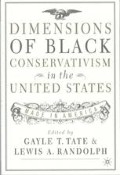Abstract
In The Crisis of the Negro Intellectual (1967), Harold Cruse described the dualism in challenges confronting black intellectuals. Cruse noted that black intellectuals were expected to be acutely attuned to the white power structure, its cultural kv stitutions, and larger dynamics of economics, politics, and social class in order to control or affect them. At the same time, these black intellectuals were challenged to define and negotiate a role that would combine cultural and political criticism and kv elude programs and demands.1 Cruse recognized that the institutional resources supportive of black intellectuals existed outside the black community and that these resources constrained black intellectuals to play a narrower role. Cruse’s critique of black intellectuals focused on their uncritical embracing of liberalism and integration.
Access this chapter
Tax calculation will be finalised at checkout
Purchases are for personal use only
Preview
Unable to display preview. Download preview PDF.
Notes
H. Cruse, The Crisis of the Negro Intellectual: From Its Origins to the Present (New York: William Morrow, 1967).
M. Harrington, “The New Class and the Left”, in The New Class? ed. B. B. Biggs. (New Brunswick, NJ: Transaction Books, 1979), p. 137.
J. Habermas, The New Conservatism: Cultural Criticism and the Historians’ Debate (Cambridge: MIT Press, 1989), p. 24.
G. Dorrien, The NeoConservative Mind: Politics, Culture, and the War of Ideology (Philadelphia: Temple University Press, 1993), p. 8.
P Steinfels, The NeoConservatives (New York: Simon and Schuster. 1979).
P Wilayto, The Feeding Trough: The Bradley Foundation, “The Bell Curve”, and the Real Story behind W-2, Wisconsins National Model for Welfare Reform (Milwaukee: A Job Is a Right Campaign, 1997), pp. 13–14
M. Harrington, “The Welfare State and Its NeoConservative Critics” in The New Conservatives: A Critique from the Left, eds. L. Coser and I. Howe (New York: Quadran-gle/New York Times Book Company, 1974), pp. 29–63.
R Berger and T Luckmann, The Social Construction of Reality: A Treatise in the Sociology of Knowledge (Garden City, NJ: Anchor Books, 1971).
P Berger and J. Neuhaus, To Empower People: The Role of Mediating Structures in Public Policy (Washington, D.C.: American Enterprise Institute for Public Policy Research, 1977).
P Berger and J. Neuhaus, To Empower People: From State to Civil Society (Washington, D.C.: American Enterprise Institute, 1996).
O. Cox, “Leadership among Negroes in the United States”, in Studies of Leadership: Leadership and Democratic Action, ed. by Alvin Gouldner (New York: Harper, 1950), pp. 228–271.
M. Marable, How Capitalism Underdeveloped Black America (Boston: South End Press. 1983).
See A. Williams, “Black and Conservative?” Reader’s Digest, November 1995: pp. 157–59; R. Woodson, On the Road to Economic Freedom (Washington, D.C.: Regnery-Gateway, 1987)
S. Steele, “A Conversation with Shelby Steele” in Black and Right: The Bold New Voice of Black Conservatives in America, eds. by S. Faryna, B. Stetson, and J. G. Conti (Westport, CT: Praeger, 1997), pp. 143–51.
J. G. Conti and B. Stetson. Challenging the Civil Rights Establishment: Profiles of a New Black Vanguard (Westport, CT: Praeger, 1993), p. 87.
T Sowell, Black Education: Myths and Tragedies. (New York: MacKay, 1972).
T Sowell, Race and Economics (New York: Longman. 1975).
T Sowell, Civil Rights: Rhetoric or Reality? (New York: William Morrow, 1983).
G. Loury, “The Moral Quandary of the Black Community.” The Public Interest, 79 (Spring 1985): 9–22.
G. Loury, “Going Home.” Common Quest: The Magazine of Black Jewish Relations 1, (2) (Fall 1996): 11–14.
Conti and Stetson. Challenging the Civil Rights Establishment: Profiles of a New Black Vanguard (Westport, Connecticut: Praeger. 1993), 165.
S. Steele, The Content of Our Character: A New Vision of Race in America, (New York: Harper Perennial, 1990.
B. Boxill, Blacks and Social Justice (Boston: Rowman and Littlefield, 1992).
T. D. Boston, Race, Class, and Conservatism (Boston: Unwin Hyman, 1988).
H. Cruse. Plural but Equal: Blacks and Minorities in America’s Plural Society (New York: William Morrow, 1987).
R. S. Roberts, Clarence Thomas and the Tough Love Crowd: Counterfeit Heroes and Unhappy Truths (New York: New York University Press, 1993), pp.31-32.
C. Thomas, “No Room at the Inn: The Loneliness of the Black Conservative”, in Black and Right: The Bold New Voice of Black Conservatives in America, eds. by S. Faryna, B. Stetson, and J. G. Conti (Westport, CT: Praeger, 1997), p. 9.
J. Mayer, Strange Justice: The Selling of Clarence Thomas (Boston: Houghton Mifflin, 1994).
Editor information
Editors and Affiliations
Copyright information
© 2002 Gayle T. Tate and Lewis A. Randolph
About this chapter
Cite this chapter
Wilson, F.H. (2002). Neoconservatives, Black Conservatives, and the Retreat from Social Justice. In: Tate, G.T., Randolph, L.A. (eds) Dimensions of Black Conservatism in the United States. Palgrave Macmillan, New York. https://doi.org/10.1057/9780230108158_11
Download citation
DOI: https://doi.org/10.1057/9780230108158_11
Publisher Name: Palgrave Macmillan, New York
Print ISBN: 978-0-312-29370-3
Online ISBN: 978-0-230-10815-8
eBook Packages: Palgrave Social & Cultural Studies CollectionSocial Sciences (R0)

